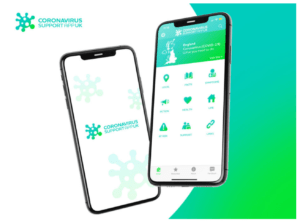According to CB Insights, a business intelligence platform, “Covid-19 is unsurprisingly catalyzing the adoption of contactless biometrics. Big tech companies and others are now in the market selling AI-enabled thermal imaging cameras for fever detection. Voice tech startups are rolling out software for ‘cough and sneeze detection.’ Facial recognition software globally is getting an upgrade to detect masked faces.”
 And according to a report on PRNewswire, “Wearable devices have now become one of the fastest developing segments of the technology and medical technology industries. Wearable devices were designed to track real time data on various activities of its user and can be worn on the body with ease. Generally, these devices include analog-watches, smartwatches, glasses, fitness trackers and others. More recently, synchronization of such devices with smartphones has become an evolving technology with a numerous new features being incorporated into the devices. This increase of diverse applications is a major driver for this market’s growth. Furthermore, the implementation of the Internet of Things (IoT) that is used for the development of new features among smartwatches has created an essential transformation in the watch industry. Overall, according to Knowledge Sourcing Intelligence LLP, the wearable devices market is projected to grow at a compound annual growth rate of 22% to reach $80Bn by 2025, from $24Bn in 2019.
And according to a report on PRNewswire, “Wearable devices have now become one of the fastest developing segments of the technology and medical technology industries. Wearable devices were designed to track real time data on various activities of its user and can be worn on the body with ease. Generally, these devices include analog-watches, smartwatches, glasses, fitness trackers and others. More recently, synchronization of such devices with smartphones has become an evolving technology with a numerous new features being incorporated into the devices. This increase of diverse applications is a major driver for this market’s growth. Furthermore, the implementation of the Internet of Things (IoT) that is used for the development of new features among smartwatches has created an essential transformation in the watch industry. Overall, according to Knowledge Sourcing Intelligence LLP, the wearable devices market is projected to grow at a compound annual growth rate of 22% to reach $80Bn by 2025, from $24Bn in 2019.
In the medical field, growing health awareness at the global level is expected help the medical wearable device segment reach new highs. Medical wearables are built to track vital signs and other health indicators, including calorie intake, cholesterol levels, heartbeat rate, blood pressure, glucose levels, sleeping patterns and more. Now, the rising occurrence of chronic diseases, along with increasing mortality rates, is a major area of concern among people as well as government organizations. Therefore, healthcare providers are offering personalized care including continuous and remote patient monitoring.
Research into Covid-19 and diabetes
Following Diabetes UK’s rapid research funding call in April, the charity has committed £315,000 to research into Covid-19 and its impact on people with diabetes. The four studies, some in partnership with JDRF and Moorfields Eye Charity, will look at:
- Type 1 diabetes: The impact Covid-19 has on people with Type 1 diabetes and the management of the condition, giving scientists and clinicians a clearer idea of the risk that coronavirus poses to people with Type 1 (University of Bristol and co-funded with JDRF).
- High-risk groups: Which people with the condition are most at risk to experience severe symptoms of Covid-19 and why, enabling the NHS to improve care for people admitted to hospital with diabetes and coronavirus and helping to save lives (University of Exeter).
- Risk factors & complications: The effects of the Covid-19 pandemic on risk factors for diabetes complications, including blood sugar levels, blood pressure, and bodyweight (University of Glasgow).
- Sight loss: The effects of disruptions caused by the coronavirus pandemic on people with diabetes’ vision, helping those with diabetes and eye problems through the pandemic (Moorfields Eye Hospital NHS London and co-funded with Moorfields Eye Charity).
Virus support app
A free app for coronavirus support has been launched to help people – particularly in ‘at-risk’ groups – cope during the pandemic.
The Coronavirus Support App enables you to access trusted health information and practical advice on a wide range of topics in seconds – even when offline:
- avoid misinformation – open the app and discover clear health and wellbeing information you trust, all in one place
- learn to self-care – get answers to common health questions and gain the confidence to tackle everyday challenges
- know where to get help – easily find useful links to official NHS advice, current government guidance, helplines and charities.
The app can also help people become more confident in managing particular challenges brought to us by the coronavirus crisis:
- Assess COVID-19 symptoms – discover how to stay well, recognise the symptoms of coronavirus (including the warning signs) and know what to do next
- Manage in a crisis – know where and how to seek help if you’re experiencing domestic abuse or are in a crisis situation
- Stay safe – learn how to stay safe if you’re in an ‘at-risk’ group (for example, if you have diabetes).
The app, developed by Expert Self Care together with over 40 UK health professionals and experts, is not-for-profit and free to download from the Apple App Store and Google Play.
Weight stigma
 Memes, before and after pictures and ‘light-hearted’ jokes around weight gain during the Covid-19 pandemic can be harmful to many but particularly for marginalised identities, says Emma Laing, clinical associate professor and director of dietetics in the University of Georgia College of Family and Consumer Sciences.
Memes, before and after pictures and ‘light-hearted’ jokes around weight gain during the Covid-19 pandemic can be harmful to many but particularly for marginalised identities, says Emma Laing, clinical associate professor and director of dietetics in the University of Georgia College of Family and Consumer Sciences.
“Poking fun about gaining weight perpetuates the idea that thinner bodies are more disciplined, healthier and more worthy of attention, and this is simply untrue,” Laing said. “The thin ideal standards of beauty are unrealistic for people who are genetically larger.”
Another hidden message is the assumption that people have the privilege of focusing on health goals at the moment, Laing said. The messages also ignore critical issues like socioeconomic status, food insecurity and compromised air and water quality that can lead to stress and chronic illness, she added.
“Many individuals have had drastic changes to their work demands, are experiencing financial hardships or have legitimate concerns for their safety, so concerns about healthy eating or exercise might not be taking precedence,” Laing said.
“While weight-normative strategies – pursuing weight loss to improve health – elicit long-term successes for some individuals, many are unable to maintain this,” Laing said. “Using bodyweight alone as a measure of success can backfire, particularly if indicators like blood pressure, blood sugar and cholesterol levels improve regardless of changes in weight.”
If a person is uncomfortable with how their body has changed over the last few months, Laing suggests contacting a registered dietitian who can help them achieve wellness goals.



